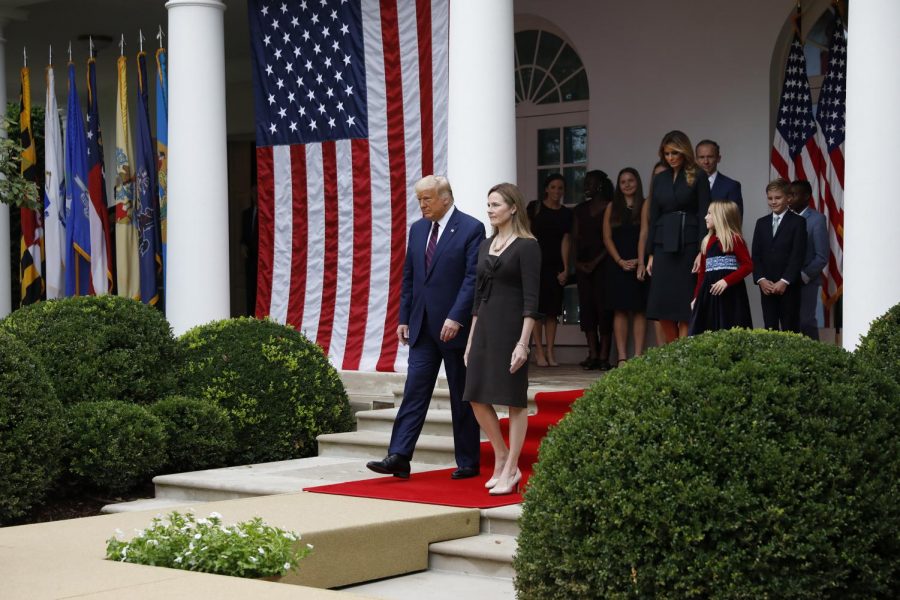OPINION: The battle over the Supreme Court is a horror show full of hypocrisy and partisanship
Judge Amy Coney Barrett walks from the Oval Office to be introduced by President Donald Trump as his Supreme Court Associate Justice nominee in the Rose Garden of the White House in Washington, D.C., on Saturday, Sept. 26, 2020. (Yuri Gripas/Abaca Press/TNS)
The vacant seat of the late Justice Ruth Bader Ginsburg has left many Americans feeling uncertain, especially with the weight of such a consequential election season among us. There are questions regarding how this will affect the 2020 presidential race, as this is said to be an advantage to those on the right. Trump’s top pick, Amy Coney Barrett, was formally nominated in the White House Rose Garden on Saturday, just one day after Ginsburg was lying in state at the U.S. Capitol. The formal Senate confirmation hearings are to take place beginning on Oct. 12, as there seems to be a mad dash by the GOP to place her on the high court as soon as possible. The following are two arguments for and against picking a Supreme Court nominee from contributing writers Hannah Horowitz and Nicolas Zaccardi.
Hannah Horowitz
The race to confirm Amy Coney Barrett comes off a string of remarks by Trump this past week stating that the Supreme Court will likely decide the outcome of the 2020 presidential election. Like most things expelled from Trump’s mouth, this statement has little truth and zero evidence behind it. His attempts to damage the validity of mail-in voting have not seemed to faze North Carolina voters, as there has been an uptick of absentee requests. Trump may want to hold off on the victory party before assuming his newest appointee will hand him the presidency, rather than American voters giving him the boot.
The GOP’s glaringly obvious hypocrisy with this appointment only reminds us of when the Senate blocked Merrick Garland’s nomination in 2016. Before Obama was even able to name his nomination, McConnell vehemently opposed any appointment to the Supreme Court, stating that the next sitting president should make that call.
“The American people should have a say in the court’s direction. It is a president’s constitutional right to nominate a Supreme Court justice, and it is the Senate’s constitutional right to act as a check on the president and withhold its consent,” noted McConnell in 2016.
Apparently, that no longer applies when your buddy is losing in every national poll. Voices in large numbers from all across the country are speaking out against the hypocrisy, but the GOP has no problem with silencing them. The Trump reelection bid desperately needed a win, as the “You Won’t Be Safe in Biden’s America (despite us being in Trump’s America)” platform is not paying off on a national level. GOP senators are more than willing to rush through yet another stolen Supreme Court seat. I have no doubt that this will damage the credibility of the confirmation process, as there have already been comments from both sides regarding the power play that is ensuing on the Supreme Court. Despite its position as a legal body that serves to uphold the laws of our nation and not play party politics, it is becoming increasingly partisan.
However, Republication Senators Susan Collins from Maine and Lisa Murkowski from Alaska oppose a new appointment and plan to vote against Barrett’s confirmation. The special election in Arizona could have Democrat Mark Kelly seated by November 30, leaving Democrats with three Republicans needed to potentially block the confirmation. However, this scenario is unlikely, as Mitt Romney (R- UT), a critic of the president, has pledged his support to confirm Barrett. Lindsey Graham (R- SC) who had opposed Garland’s nomination in 2016, stating that “the next president should make the nomination,” has switched his tune, as he faces a tough reelection race against Democratic challenger Jamie Harrison.
This will undoubtedly lead the democrats to retaliate, especially if Trump loses the presidential race and Barrett is still seated to the court. It will backfire on republicans in terms of the actual number of justices on the high court, as it is set by a statute and not by the Constitution. There has been discussion on the left about “packing the court” and changing the number of justices from 9 to 13 or 15. Within the first few months of 2021 there could be two additional justices to the court, with more to follow. This could possibly set a dangerous precedent, with both parties going back and forth each time they are in power. Although Biden has previously opposed the idea of adding more justices, pressure from the party on top of massive economic recovery and a federal pandemic response may change that. There is little chance that the democrats are going to stand by and allow republicans to claim a conservative majority on the Court for the next number of years. The Supreme Court is still a partisan battleground, as both sides work fervently to seat as many liberal or conservative judges as possible. The anger from the left could also spill over to the polls (if the last four years didn’t take care of that) and allow the democrats to claim all the houses in the upcoming election. Either way, GOP lawmakers are not going to examine their past statements and retaliate against the Trump administration. They are going to plant firmly in their own hypocrisy and ignore Ginsburg’s own last wish. If we thought the election season was already bad, it is about to get far uglier and far more vicious.
Though I was struck by the brazen hypocrisy of the Senate Majority Leader Mitch McConnell’s decision to push through a replacement for the late justice, the issue seems to have firmly solidified itself as a partisan issue, like most issues as of late. What seems like a prime opportunity to encourage republican turnout in the upcoming election has turned into a race for confirmation. This opportunity is seemingly being one that is too good to turn down for the conservative lawmakers, regardless of their 2016 decision to prevent the appointment of Merrick Garland. However, even though I am emphatically against the appointment, there are certainly arguments to be made for a quick confirmation, one that is not without precedent. I will attempt to justify, whether logical or not, what in my mind is a new standard of brazen hypocrisy.
Nicolas Zaccardi
The argument laid out by McConnell himself was certainly a lackluster response to the accusations of hypocrisy. The senator justified his decision citing the makeup of the Senate during the respective years the Supreme Court nominations were made. While the republicans did not control the presidency back in 2016, they do now. That in tandem with a republican Senate means McConnell believes the people have made their choice and it is within their right to appoint a justice. While there is technically a difference in scenarios, this is far from a sound argument and makes it sound like they are splitting hairs.
Where republicans may have a legitimate argument is in precedent beyond 2016. Though there have not been any cases as egregious as the Merrick Garland dismissal, there are numerous examples of contentious Supreme Court nominations that did not always end up confirmed. In 1992 former senator Joe Biden called for a hold on a Supreme Court appointment if a vacancy were to arise. Dubbed the “Biden rule,” republicans have used this to justify the notion that the incoming president should select the nominee indirectly during an election year.
Though democrats and Biden himself have claimed that the rule is being misrepresented, it certainly hasn’t stopped republicans from using it as justification for appointment. In their minds it doesn’t hurt that Biden would end up being the one to appoint a new justice if he were to win in the first place, so any justification linked to Biden resonates all the better.
But beyond any moral or historical justification, the law is on their side. It is well within their right to appoint a justice so long as the president is in office. Until at least Jan. 20 of next year, Donald Trump is still the president, and under Article II of the Constitution, often referred to as the Appointments Clause, it is the president’s right to nominate a Supreme Court justice, no matter what term phase they are in. Regardless of the actions in 2016, President Trump was not in office and is not beholden to any precedent when it comes to a nomination in the event of a vacancy. While Senate democrats will certainly try to make a moral appeal, they will be unable to claim that an appointment would be unconstitutional unless they are arguing in bad faith.
And finally, there is the suicide justification. This is less of an argument than it is grounds for their decision to ram through a nominee in the first place. Speaking electorally, it makes much more sense to hold off on any appointment. This allows the precedent you set to drive voters who align with you and care about a lifelong appointment to the Supreme Court to vote. The decision on the part of the majority leader makes several things clear. For one, it does not instill confidence on McConnell’s faith in Trump’s electoral chances. If the senator were confident that Trump was going to win reelection, he almost certainly would not be fast-tracking an appointment. Second, it does not seem as though McConnell has much faith in retaining the Senate either. While polling is close and the future political makeup of the chamber is still very much up in the air, it certainly does not look like McConnell likes his chances. At the very least, he is not willing to risk losing out on a lifetime appointment of a solidly conservative Supreme Court justice and, perhaps more enticingly, a 6-3 majority of conservative justices. At this point, the question of if there will be an appointment has turned to when there will be an appointment and how democrats may retaliate.












